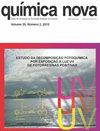喷泉还是水槽?对巴西大陆架二氧化碳通量的回顾
IF 0.5
4区 化学
Q4 CHEMISTRY, MULTIDISCIPLINARY
引用次数: 1
摘要
源还是汇?巴西大陆架二氧化碳通量综述。在南半球的海洋,主要是沿海地区和大陆架,对全球碳平衡估计的研究仍处于起步阶段。即使在巴西,尽管是大陆比例海岸线,但海相碳酸盐体系和海气界面CO2通量的研究仍然存在很大的不一致性。本文介绍了2000年至2022年间发表的关于巴西海岸二氧化碳通量的研究综述,旨在绘制巴西大陆架二氧化碳通量的分布图,了解其作为二氧化碳源或汇的作用。总的来说,大规模的研究表明,巴西大陆架在海气CO2通量上表现出纬度上的变化,在不受亚马逊河羽流影响的北部主要表现为源,而在南部则表现为汇。我们还发现,对中尺度和天气性海洋和气象事件的发生以及不同生态系统的存在有很强的影响,这些影响可以改变局地CO2通量的行为。然而,大陆架沿线以及整个海岸不同季节的数据仍然存在许多空白。本文章由计算机程序翻译,如有差异,请以英文原文为准。
FONTE OU SUMIDOURO? UMA REVISÃO SOBRE OS FLUXOS DE CO2 NA PLATAFORMA CONTINENTAL BRASILEIRA
SOURCE OR SINK? A REVIEW OF THE CO2 FLUXES AT THE BRAZILIAN CONTINENTAL SHELF. Studies of global carbon balance estimates are still incipient in the oceans of the Southern Hemisphere, mainly in coastal areas and continental shelf. Even in Brazil, despite its continental proportion coastline, there is still a great inconsistency in studies on the marine carbonate system and CO2 fluxes at the air-sea interface. This article presents a review of studies on CO2 fluxes on the coast of Brazil, published between the years 2000 and 2022, aiming to map the distribution of CO2 fluxes on the Brazilian continental shelf, to understand its role as a source or sink of CO2. In general, large-scale studies show that the Brazilian shelf exhibits a latitudinal variation of air-sea CO2 fluxes, behaving mainly as a source in the north, where there is no influence of the Amazon River plume, and as a sink in the south portion. We also identified there is a strong influence on the occurrence of mesoscale and synoptic oceanographic and meteorological events, and the presence of different ecosystems, which can change the behavior of CO2 fluxes locally. However, there are still many data gaps along the continental shelf, as well as in different seasons for the entire coast.
求助全文
通过发布文献求助,成功后即可免费获取论文全文。
去求助
来源期刊

Quimica Nova
化学-化学综合
CiteScore
1.60
自引率
12.50%
发文量
72
审稿时长
2-4 weeks
期刊介绍:
Química Nova publishes in portuguese, spanish and english, original research articles, revisions, technical notes and articles about education in chemistry. All the manuscripts submitted to QN are evaluated by, at least, two reviewers (from Brazil and abroad) of recognized expertise in the field of chemistry involved in the manuscript. The Editorial Council can be eventually asked to review manuscripts. Editors are responsible for the final edition of QN.
 求助内容:
求助内容: 应助结果提醒方式:
应助结果提醒方式:


